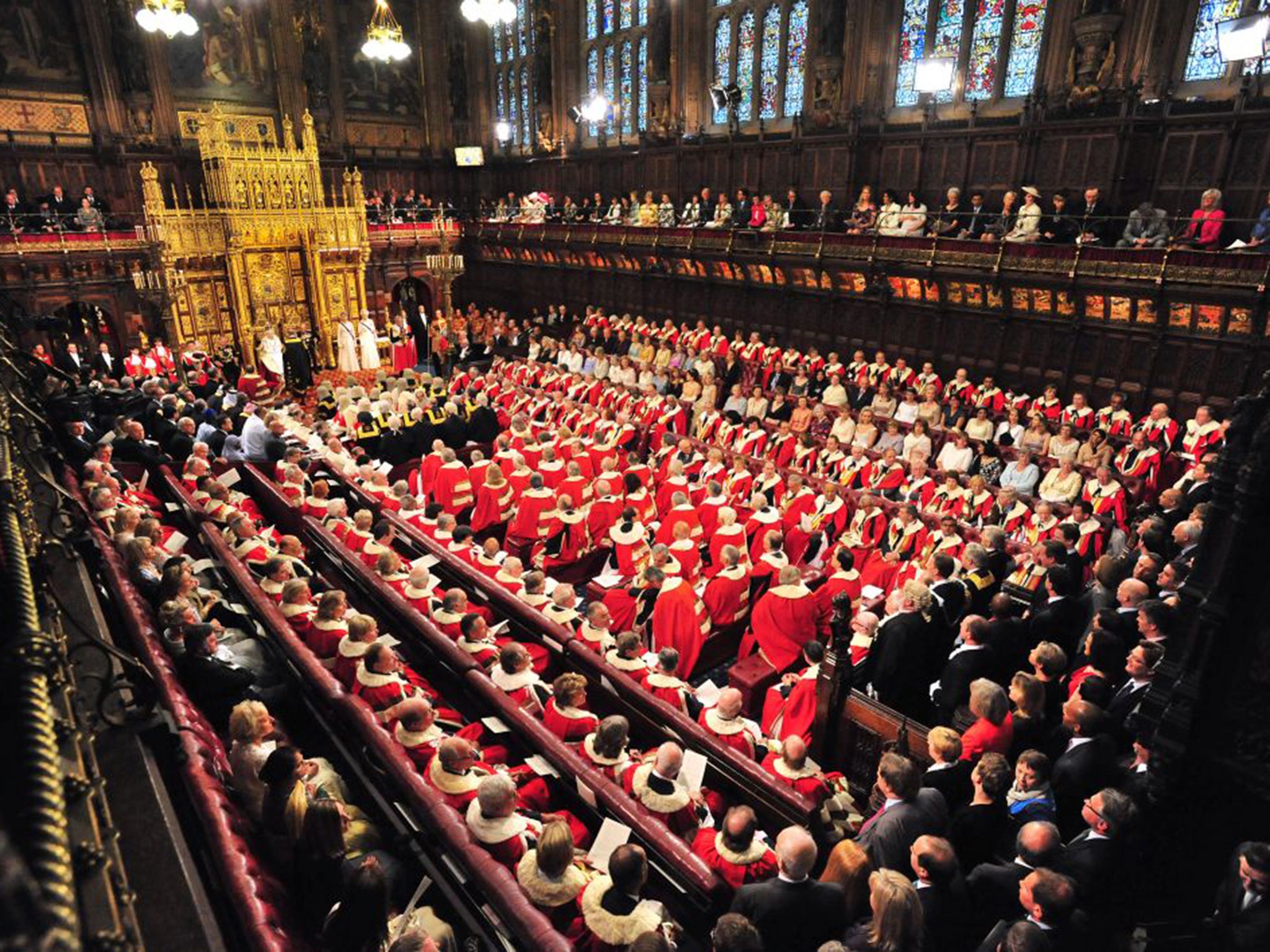House of Lords could face reduction in size amid concerns over ever-increasing number of peers
At present, there is not enough room to seat more than half of members

A cross-party group of peers and MPs have quietly set up a committee to look into reducing the size of the House of Lords – a swollen chamber second in numbers only to China’s National People’s Congress.
Lord Cormack, a member of Edward Heath’s Tory government in the 1970s, will publish a report later this year which could recommend cutting the number of peers or reducing the intake to the chamber every year.
There are currently more than 820 members of the House of Lords, up from 666 in 1999 when most hereditary peers were removed by the House of Lords Act. The number is set to rise again because David Cameron is likely to appoint more Conservative peers this summer to better reflect the make-up of the Commons. The Prime Minister appointed 186 peers in his first term of office, compared with only 34 created by Gordon Brown in the preceding three years.
Lord Cormack has campaigned for reform of the upper chamber for about 14 years, but his new committee is specifically focused on cutting numbers. At present, there is not enough room to seat more than half the peers, which can lead to strict time limits on speeches during popular debates.
The Leader of the House of Lords, Baroness Stowell, has vowed to be “all ears” when the report is published and says she will “listen very carefully to what noble Lords put forward”. It is understood that MPs are also members of the committee, which is thought to comprise around 10 people, as well as Lord Norton. A Tory constitutional expert is also involved.
A source close to the committee said: “It will be addressing the issue of numbers and procedural matters of the House of Lords.”
One MP who is involved added: “Either you’ve got to stop the number of peers coming into the Lords or you’ve got to start getting rid of some who are already there. It’s quite sensitive on how you would do this.”
The MP said there were growing concerns that an unelected chamber was growing, just as the elected Commons is set to shrink from 650 to 600 members in 2020 under a proposal laid out by Mr Cameron.
This has sparked a separate argument over whether the executive also needs to be reduced – there are around 140 ministers and parliamentary private secretaries, most of whom are MPs. Many backbenchers and opposition MPs believe that there needs to be a similar reduction in ministerial positions to ensure their work is properly scrutinised by the remainder of the Commons.
Peter Bone, the rebellious Tory MP for Wellingborough (inset, left), said: “Certainly, if you reduce the number of MPs, then you’re going to need to reduce the size of government. You could get rid of the Department of Energy and Climate Change and put it in Business, Innovation and Skills.
“The Government has got to look seriously at this – the Government payroll is getting huge,” he added.
Peers are also plotting to veto government plans to bring forward changes to the way the electoral roll is collected. In 2013, it was announced that there would be a transition from the head of a household registering voters in their home to individuals doing it themselves, the change to be introduced over a three-year period.
The Government now wants to complete the switch by the end of this year. But the Electoral Commission found that 1.9 million people’s entries are still registered under the transitional arrangements, which means that they might not be eligible to vote in 2016, a year that includes Welsh and Scottish elections.
The Lib Dems have tabled a motion against the move in the Lords and Commons and the Labour and crossbench support should be enough to bring down the plans.
End of the peers show?
• There are 783 peers, excluding the 40 who are on leave of absence or currently disqualified. Of the 783, 192 are female and 591 male.
• The largest party in the Lords is the Conservatives with 226 peers – Labour has 212, the Lib Dems 101, and there are 179 crossbenchers.
• The SNP refuses to sit in an unelected chamber; the balance is made up by bishops, non-affiliated peers and members of smaller parties, such as Plaid Cymru and Ukip. .
• The early incarnation of the upper house comprised archbishops, bishops, abbots, priors and noblemen in the 14th century.
• Bishops were excluded from the Lords during the civil war in 1642, but were reinstated under the Clergy Act 1662.
• Peers blocked the Liberal Budget of 1909, which led the party to introduce a Bill to limit the Lords’ power to veto legislation passed in the Commons.
• The House of Lords Act 1999 removed most hereditary peers, though 92 survived after a compromise between the then PM, Tony Blair, and Conservative Viscount Cranborne.
• The Queen’s Speech takes place in the Lords.
• The ermine robes worn at the state opening are made out of rabbit fur rather than stoat.
• Furniture in the House of Lords has been valued at more than £13.5m.
• Benches in the Lords are red because a succession of kings liked the colour.
• Peers receive a £300 day-rate allowance, or £150 for attending for less than a full sitting day. They do not receive a salary and can, within limits, claim travel expenses
Source: Houses of Parliament records; BBC
Subscribe to Independent Premium to bookmark this article
Want to bookmark your favourite articles and stories to read or reference later? Start your Independent Premium subscription today.

Join our commenting forum
Join thought-provoking conversations, follow other Independent readers and see their replies